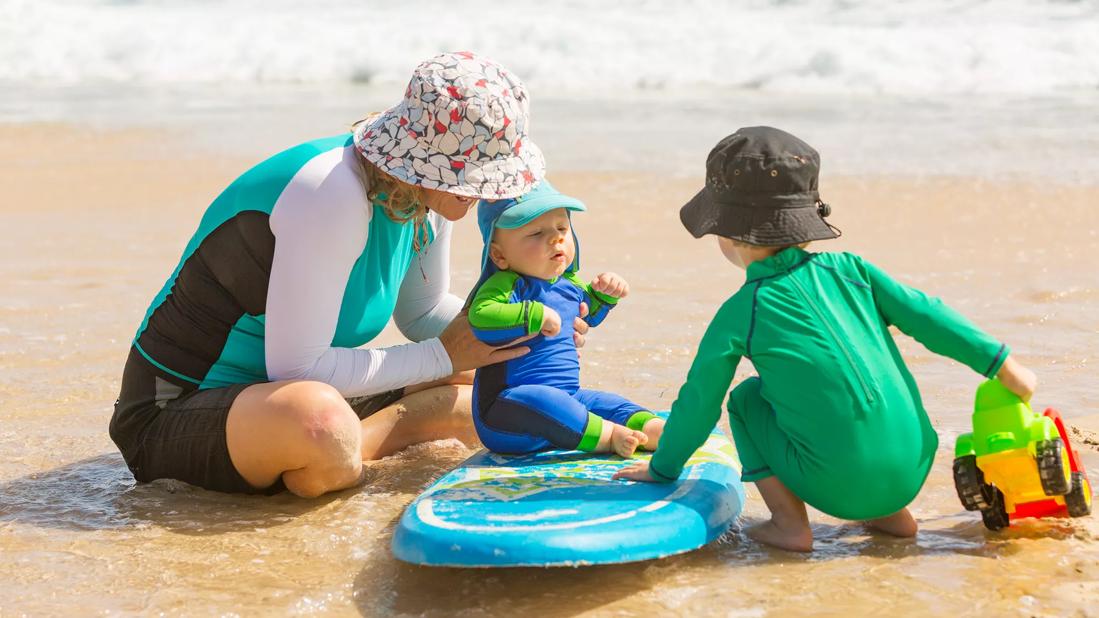Apparel provides an easier and larger barrier against UV rays

Image content: This image is available to view online.
View image online (https://assets.clevelandclinic.org/transform/a164a20c-c721-4536-9ada-dc35ab0318f3/sunProtectClothing-508346730-770x533-1_jpg)
Woman and children wearing UV protective clothes at the beach.
If you’re an active beachgoer, surfer or water baby, chances are, you’ve complained about having to lather on the sunscreen every other time you turn around.
Advertisement
Cleveland Clinic is a non-profit academic medical center. Advertising on our site helps support our mission. We do not endorse non-Cleveland Clinic products or services. Policy
After all, it’s recommended to reapply sunscreen every two hours or so ― especially if you’re toweling off, swimming or sweating frequently.
And although this won’t solve all of your problems ― because it’s recommended to be used in coordination with sunscreen ― may we introduce to you sun-protective clothing?
Huh? How is it different from just regular old clothes, you ask?
Dermatologist Alok Vij, MD, explains how UPF clothing works and what other factors to consider when getting dressed for optimal protection.
Well for starters, Dr. Vij says that when talking about fabrics use the term “UPF,” which stands for ultraviolet protection factor. And with sunscreen, use the term “SPF,” or the more familiar sun protection factor.
“Most cotton shirts give you an equivalent of about a UPF of 5 when you’re wearing it,” Dr. Vij explains. “Most fabrics that we wear are a loose weave that lets visible light peek through and get to our skin. With UPF clothing, the weave is different and often is made from a special fabric to help form a barrier against the sun’s rays.”
UV light can penetrate through the micro holes in the weaves of regular clothes or can even travel directly through a light-colored shirt. With UPF clothing, the block is much greater, giving you more protection from the sun.
Advertisement
Most sun-protective clothing looks and feels like activewear or athleisure and comes in a variety of shirts, leggings and hats. And because of the higher thread count, it often feels a little more luxurious vs. your standard t-shirt.
Look for a higher UPF rating number when purchasing UPF clothing. For example, 30 UPF means that the item will allow 1/30th or 3.33% of UV rays to pass through.
Any garment that allows less than 2% of UV rays will be labeled UPF 50+, the highest rating. 15 UPF is the lowest rating.
An item needs to have 30 UPF or higher to obtain the Skin Cancer Foundation’s seal of recommendation.
What about the life cycle of sun-protective clothing?
Dr. Vij says like any other fabric, it will eventually break down with frequent use, but it’s reasonable to expect the apparel to last two or three years.
If an item uses a finish to get its UPF rating, make sure you check the label. The finish can start to diminish after each wash, so typically, the label will list how many washes the UPF rating is good for.
Beyond making sure your clothing has UPF, here are a few other factors to consider.
If you’re headed outside, try dressing in dark-colored clothes. Those dark colors — black, brown, navy, dark green, burgundy — will prevent more UV rays from touching your skin.
Items made with tightly woven fabric allow less UV light to pass through them. Items made of wool, denim and canvas are densely woven and can offer protection from the sun.
So, reach for thicker fabrics instead of thinner ones. A good rule of thumb? If you can see through the fabric, it’s not going to offer much protection from UV rays.
Don’t reach for that cotton T-shirt. Natural fabrics like cotton and hemp don’t do a good job of protecting you from UV rays.
Instead, wear clothes made with polyester and nylon.
For most people, it’s easier to toss on clothing rather than lather up with sunscreen every couple of hours.
A shirt, pants and hat can give you great sun protection coverage, but there are still areas exposed to UV rays, like your hands, neck and face.
This is where sunscreen still comes into play and can help prevent sunburn and skin cancer.
“Most sun-protected fabrics are UPF 50 or higher ― so better than your typical SPF sunscreen,” says Dr. Vij. “But it’s recommended for people to choose a mixture of both sunscreen and clothing to get the best possible protection.”
Advertisement

Sign up for our Health Essentials emails for expert guidance on nutrition, fitness, sleep, skin care and more.
Learn more about our editorial process.
Advertisement
Make sure you use a high SPF formula, apply enough and reapply throughout the day
Sun poisoning is a severe sunburn that seems similar to an allergic reaction
Learn the warning signs
Polarized lenses have an added benefit of a special coating that reduces glare on reflective surfaces like water and snow
The simple, straightforward and hard-lined answer is no
Soothe your red, burning skin by applying aloe vera, moisturizing and using a cold compress
Even on cloudy days or simply running errands, sunscreen is a must
A sunburn will leave you itchy and red, while sun poisoning can feel like an allergic reaction
Type 2 diabetes isn’t inevitable with these dietary changes
Applying a hot or cold compress can help with pain
Pump up your iron intake with foods like tuna, tofu and turkey